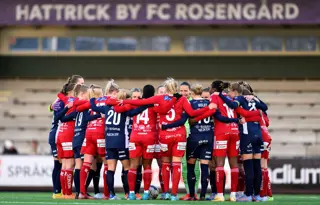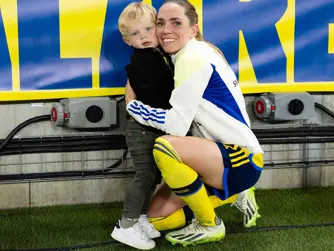Player Story
Elin Landstrom: "Why Sweden’s new CBA is a much better deal for players"

A Serie A winner with Roma in 2023, Elin Landstrom retired from playing in early February 2024 and is now a lawyer and works for Swedish player union Spelarforeningen as player legal manager and a board member. The former left-back discusses the collective bargaining agreement (CBA) that Spelarforeningen arranged in late 2023.
By Elin Landstrom
It was a long process. The old collective bargaining agreement (CBA) in Sweden officially ran until 2013 but we continued working with it. In 2019, we started negotiations with the league and our goal was to improve the CBA.
However, in December 2022 the league cancelled the old agreement, meaning we would have to play without a CBA until a new one was agreed. Luckily, the clubs arranged the players’ insurance before the 2023 season started in March.
The league also informed us that the employers’ alliance would negotiate on their behalf, which caused serious problems as the alliance only wanted to negotiate with Unionen, one of our national trade unions in Sweden, instead of us. Of course, we, the players, didn’t accept this. To us, it has always been clear that Spelarforeningen is the only organisation representing women’s footballers. None of the players were members of Unionen, while Spelarforeningen also had all the know-how surrounding the women’s game.
It became a big issue, which was sad as there were so many more important matters to tackle. The positive aspect was that all players stuck together, especially when the league started saying bad things about the union. Before matches, players of both teams would gather in the centre circle and stand still together in protest after the referee started the match. And the national team created a video saying that Spelarforeningen is the only representative.

In the end, we made a deal with Unionen. They couldn’t do anything without us: we would be present during negotiations and they were only allowed to sign the CBA after we approved it. The employers’ alliance accepted this because they were under a lot of pressure.
According to Swedish law, a CBA must be renewed within a year. If that doesn’t happen, then labour law will automatically apply, which means that players would be on indefinite contracts and could terminate their contract with one month’s notice, just like regular workers. As 10 months had already went by without a CBA, the league was really pushing to make a deal.
The main objective on our list was the guarantee that players would receive 90 percent of their salary if they were sick or injured. As a player, I need to have the security that I will keep my economic standards even though I'm injured. If not, I may be scared of getting injured; I may not be able to commit myself 100 percent to a challenge because if I got injured, I might not get paid next month – which is ridiculous. And if you can’t commit 100 percent to a challenge, then you will not develop as a player, and you won't develop as a team.
Regular workers in Sweden receive their full salary when they get injured or sick during their work; our social security system and insurances cover for that. But the insurance company, owned by the employers and employees organisations, considers our job to be high-risk for getting injuries and will not provide us with the same conditions and security. The clubs wanted to cut this 90 percent arrangement.
Not all women’s players are professional and some have a second job. If they get injured, they cannot play football. But according to our social security system, they can still do their desk job and therefore they would not pay the football salary. The club has to cover instead.
Initially the clubs didn’t want to, but we still have the guarantee. It was a big win, but it was also the minimum that we wanted; we didn’t want to have worse conditions than we had 10 years ago.
Our new CBA is a much better deal. One of the improvements is that we have included a parenting policy. We are using the maternity regulations created by FIFA and FIFPRO, and added provisions specific for Sweden about pregnancy leave, pay, individual training schedules, and childcare. For example, players will still receive 100 percent of their salary after the doctor determines that it is too dangerous to play.
Since FIFA introduced the maternity regulations, I’ve noticed a shift: more players are becoming mothers. I know of at least five and I am probably forgetting others. Ten years ago, the situation was totally different. Players would simply quit their career to start a family. Now, you see good examples of players making a comeback after pregnancy and even being better players than before. It makes a big difference realising that it is not a problem getting pregnant.
Pathway to Maternity Regulations for Professional Footballers

We also managed to secure a better pension scheme against lower costs. And something that I also find important is that players who are their team’s union representative are entitled to have days off to attend a general assembly or other important union meetings. It is paramount that the league recognised that players need to know their rights.
With this agreement, and especially the process, we have shown the players what we're doing. They appreciated our work. Our connections with many players are better than before and we have increased our number of members.
Maybe on paper it doesn’t look like we have achieved much, but as an organisation we have gained a lot. This new CBA is just the beginning.



